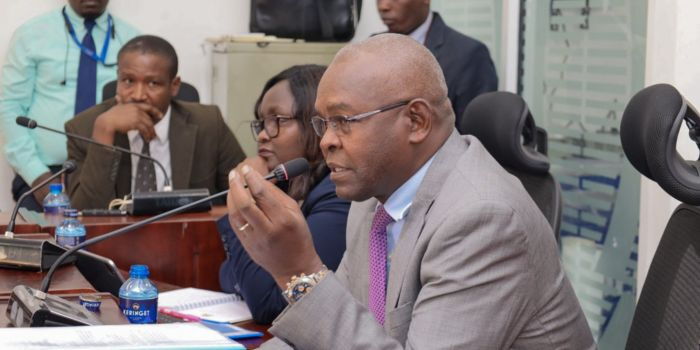The Central Bank of Kenya (CBK) has clarified that it does not have direct constitutional authority to control or close the many unauthorized bank accounts opened by county governments across the country.
Appearing before the Senate Standing Committee on Devolution and Intergovernmental Relations on Thursday, July 24, CBK Governor Dr.
Kamau Thugge stated that although CBK is the official regulator of banks in Kenya, its powers are limited when it comes to how county governments manage their finances — especially the growing number of accounts they open in commercial banks.
He emphasized that the only way to resolve the issue is to reinforce existing financial laws and regulations to promote compliance among counties.
“The Senate Standing Committee on Devolution, chaired by Senator Mohamed Abbas, held a session with Dr. Kamau Thugge, the CBK Governor, to discuss the ballooning number of bank accounts operated by county governments,” the Senate shared in an official statement.
Dr. Thugge told the Senate that although the CBK monitors and regulates commercial banks under the Banking Act, it cannot constitutionally force county governments to shut down unauthorised accounts. Instead, he suggested improving legal structures to curb the trend.
Counties Accused of Disregarding Finance Laws
According to a previous report by the Controller of Budget, Dr. Margaret Nyakang’o, as of September 30 last year, county governments had opened a shocking 2,421 unauthorised commercial bank accounts.
This marked a troubling rise of over 400 new accounts in just one year, up from 2,000 reported in the 2023/2024 financial year.
Dr. Nyakang’o warned that many counties were ignoring directives from regulatory agencies, choosing instead to open accounts outside of the CBK, making it difficult for auditors and watchdogs to monitor the flow of public funds. This trend not only raises questions about transparency but also potentially exposes public money to misuse.
Counties With the Highest Number of Accounts
The Controller of Budget’s report singled out several counties as top violators:
- Nakuru County was at the top of the list with 301 commercial bank accounts.
- Bungoma County followed closely with 300 accounts.
- Baringo and Kiambu Counties each had 292 accounts.
- Machakos County had 221 accounts, and
- Elgeyo Marakwet held 155 accounts at the time of the audit.
CBK’s Role and Limitations
Under the Banking Act (Cap 488) and CBK’s Prudential Guidelines, the Central Bank is tasked with licensing, supervising, and regulating commercial banks. However, its authority over county government finances is more limited.
The law requires that all county government revenue be deposited into a County Revenue Fund (CRF), which must be maintained at the CBK.
The CRF acts as the main account for each county, and any other financial account — such as a County Emergency Fund — must be approved by a formal resolution of the County Assembly and be managed by the County’s Executive Committee Member for Finance.
Attempts to Rein In County Finances
Efforts have been made to strengthen county financial accountability through legislation. One such proposal is the County Public Finance Laws (Amendment) Bill, 2023, which aims to create a County Assembly Fund for every county. This fund would also be held at the CBK, giving local assemblies more financial independence from county executives.
CBK’s Alternative Tools
Even though the CBK cannot directly order counties to close rogue accounts, it still has powerful tools at its disposal. As the regulator of commercial banks, the CBK can:
- Request detailed account information from commercial banks,
- Investigate irregular or suspicious transactions,
- Impose financial penalties,
- And even direct the closure of accounts that are found to be in violation of financial regulations.
In essence, while CBK cannot directly instruct counties, it can go after the banks enabling these accounts, creating indirect pressure on county governments to follow the law.
As the next steps unfold, all eyes remain on whether Parliament and oversight bodies will tighten financial controls to prevent misuse of public funds at the county level.
Join Gen Z New WhatsApp Channel To Stay Updated On time https://whatsapp.com/channel/0029VaWT5gSGufImU8R0DO30


